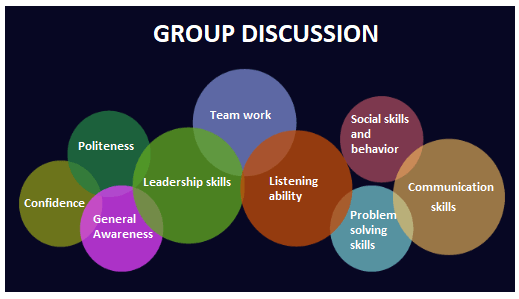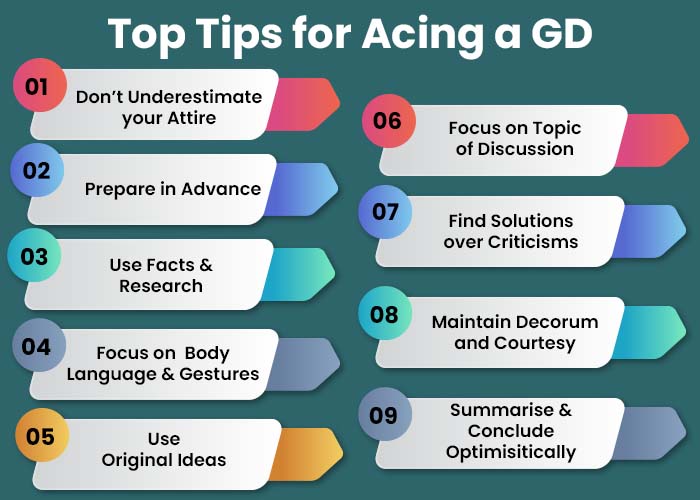Top 10 Group Discussion Tips For Your Next Interview
Table of Contents

- jaro education
- 7, June 2024
- 10:43 am
Having passed the written test and acing the personal interview, they face another crucial hurdle: the group discussion. This stage can significantly impact their job prospects, as it evaluates not only what they say but also how they say it, their listening skills, and their ability to engage with others. Group discussions test a wide range of abilities crucial in a professional setting.
Mastering group discussions is essential for job seekers as it demonstrates their quick thinking, effective communication, and teamwork skills. Employers use these discussions to assess leadership qualities, problem-solving abilities, and how well candidates handle pressure. Excelling in a group discussion can set them apart and bring them closer to their ideal job.
In this blog post, they will find the top 10 tips to help them excel in their next group discussion. From grasping the topic and maintaining composure to active listening and meaningful contributions, these tips will equip them with the strategies needed to stand out in any group discussion scenario. Let’s delve into how they can leave a lasting impact in their upcoming group discussions.

*javatpoint.com
Tip 1: Understand the Topic
Explanation: One critical aspect of excelling in a group discussion is for the individual to thoroughly understand the topic at hand. This understanding allows them to contribute meaningfully and confidently, staying relevant by providing insightful points and effectively responding to others’ arguments. Lacking a solid grasp of the topic can lead to superficial or off-base contributions, negatively impacting their performance.
Actionable Advice: For effective preparation, it’s advisable to begin by researching common group discussion topics often used in interviews. These topics may span current affairs, social issues, industry-specific trends, and abstract themes. Utilizing reliable sources such as news websites, journals, and industry reports helps gather accurate information. Additionally, practicing discussions on these topics with peers or in a study setting aids in building knowledge and enhancing the ability to articulate thoughts clearly. Engaging in mock discussions provides a sense of the group discussion environment and identifies areas for improvement.
Tip 2: Stay Calm and Composed
Explanation: Keeping a calm and composed demeanor during a group discussion is essential for expressing thoughts clearly and effectively. When one remains calm, they can think more logically and present their arguments coherently. Anxiety and nervousness may cloud judgment, leading to hurried or unclear speech and difficulty in actively listening to others. Maintaining composure aids in staying focused on the discussion topic and responding thoughtfully to raised points.
Actionable Advice: To remain calm throughout a group discussion, individuals can integrate relaxation techniques into their preparation routine. Practicing deep breathing exercises can help manage anxiety and reduce stress levels. Before the discussion begins, taking several deep breaths can help center oneself. Visualization techniques, such as picturing oneself participating confidently and calmly, can also be beneficial. Additionally, regular mindfulness or meditation practice can enhance overall composure under pressure. Utilizing these methods can significantly improve performance in group discussions by fostering focus and clear articulation of ideas.
Tip 3: Listen Actively
Explanation: Active listening emerges as a critical skill in group discussions, showcasing respect for others’ perspectives and enabling thoughtful responses. By attentively listening to others, individuals ensure their contributions are relevant and enhance the discussion’s value. Moreover, active listening fosters collaboration by building upon others’ ideas, leading to a more dynamic conversation. Demonstrating engagement and interest through active listening can positively influence how the group perceives an individual.
Actionable Advice: To cultivate active listening, individuals should focus on the speaker without interruption, maintain eye contact, and nod periodically to indicate understanding. Minimize distractions, such as checking devices or scanning the surroundings. Mentally summarize key points and, when appropriate, paraphrase them to confirm comprehension. Phrases like “I understand your perspective on…” or “To expand on that insightful point…” signal attentive listening. Additionally, asking clarifying questions demonstrates engagement and enriches the discussion. Active listening fosters a respectful and productive group discussion environment.
Tip 4: Be Clear and Concise
Explanation: In a group discussion, clarity and brevity play pivotal roles. When one speaks clearly and concisely, their points become easier to grasp and more impactful. Lengthy explanations or rambling can lead to confusion among listeners and dilute the intended message. Being concise ensures effective communication of thoughts within the allotted time, allowing others to engage as well. Clear articulation showcases organizational skills and logical presentation of ideas.
Actionable Advice: To enhance clarity and conciseness in communication, individuals can practice structured speaking. Begin with a concise introduction of the point, provide supporting arguments, and conclude with a summary. Eliminate filler words like “um,” “uh,” “you know,” and “like,” as they may diminish confidence and message clarity. Instead, take a moment to gather your thoughts before speaking. Practice summarizing articles or books succinctly and seek feedback from peers or mentors on communication brevity. Timing practice sessions aid in adapting to expressing ideas within time constraints. Clarity and conciseness not only benefit group discussions but also serve as valuable communication skills in professional environments.
Tip 5: Maintain Positive Body Language
Explanation: In group discussions, body language plays a significant role, influencing group dynamics and perceptions. Positive body language can make individuals appear confident, approachable, and engaged, enhancing their contributions and facilitating connections with other participants. Conversely, negative body language, such as slouching, avoiding eye contact, or crossing arms, can create barriers and convey disinterest or defensiveness. Being mindful of body language can have a positive impact on discussions and the impression individuals make on others.
Actionable Advice: To maintain positive body language, individuals should begin by adopting good posture, sitting upright with shoulders back to convey confidence. Making consistent eye contact with others demonstrates engagement and attentiveness; however, staring should be avoided, and efforts should be made to acknowledge each speaker with eye contact. Natural gestures can be used to emphasize points without appearing overly exaggerated. Keeping hands visible and avoiding crossed arms can prevent a defensive impression. Occasional nods indicate agreement and understanding, while leaning slightly forward demonstrates interest. Practicing these non-verbal cues can enhance confidence and engagement, improving overall effectiveness in group discussions.
Tip 6: Respect Others’ Opinions
Explanation: In a group discussion, respecting others’ opinions is crucial as it fosters a collaborative and respectful environment. Acknowledging and valuing differing viewpoints can lead to more insightful and well-rounded discussions. It demonstrates emotional intelligence, openness to diverse perspectives, and a willingness to learn from others. Disrespect or dismissal of others’ opinions can create tension and hinder the flow of conversation, reducing the overall quality of the discussion.
Actionable Advice: To respect others’ opinions, one should practice active listening and acknowledge their contributions with phrases like “That’s an interesting point,” or “It’s clear where they’re coming from.” When there’s a disagreement, do so politely and constructively. Use phrases such as “I respect your view, but I have a different perspective,” or “That’s a valid point, but have you considered…” This approach helps to keep the discussion positive and focused on ideas rather than personal differences. Avoid interrupting others and wait for them to finish before presenting a viewpoint. Showing appreciation for diverse perspectives not only enhances the discussion but also reflects positively on interpersonal skills. By respecting others’ opinions, individuals contribute to a more inclusive and productive group discussion environment.
Tip 7: Contribute Constructively
Explanation: Making meaningful contributions in a group discussion is vital as it demonstrates the individual’s ability to think critically and add value to the conversation. Constructive contributions help to advance the discussion, introduce new perspectives, and solve problems collaboratively. When participants offer well-thought-out points and build on others’ ideas, the discussion becomes more productive and insightful. This not only showcases the person’s knowledge and analytical skills but also their ability to work effectively in a team.
Actionable Advice: To contribute constructively, the individual should start by thoroughly understanding the topic and listening to others’ viewpoints. They should aim to add value by bringing in relevant information, examples, or new angles that haven’t been considered yet. Avoid repeating points that have already been made unless adding a new dimension to them. Frame contributions in a positive and forward-thinking manner, focusing on solutions and constructive feedback rather than criticisms. Use data, anecdotes, or real-life examples to support points and make them more compelling. Additionally, ask open-ended questions to stimulate further discussion and encourage others to think more deeply about the topic. By consistently making constructive contributions, individuals enhance the quality of group discussions and demonstrate their ability to think critically and collaborate effectively.

*collegevidya.com
Tip 8: Manage Your Time
Explanation: Effective time management during a group discussion is crucial for ensuring that everyone gets a chance to contribute and that the discussion remains focused and productive. Poor time management can lead to dominance by a few participants, leaving others without an opportunity to share their views. It can also result in important points being overlooked due to lack of time. Managing time well allows for a balanced and comprehensive discussion, showcasing the ability to prioritize and facilitate a group conversation.
Actionable Advice: To manage time effectively in a group discussion, be mindful of how long one speaks and make concise points. Aim to express ideas clearly within a minute or two, avoiding lengthy monologues. Pay attention to the group’s dynamics and encourage quieter members to share their thoughts by saying things like, “What do they think about this?” or “They’d like to hear their perspective on this.” This shows leadership and respect for others’ contributions. Additionally, keep an eye on the overall time allotted for the discussion and ensure that key points are covered. If the conversation starts to stray off-topic, gently steer it back by summarizing what has been said and suggesting a return to the main points. By managing time well, one helps maintain a balanced and effective group discussion.
Tip 9: Stay Relevant
Explanation: Maintaining focus on the topic during a group discussion is crucial for keeping the conversation productive and cohesive. When participants deviate from the main point, it can lead to fragmentation and a loss of direction, hindering meaningful conclusions. Remaining relevant is key to preserving the discussion’s coherence and ensuring comprehensive coverage of all essential aspects of the topic. It also showcases the ability to stay attentive and contribute meaningfully to the discourse.
Actionable Advice: To stay relevant, individuals should consistently bear the main topic in mind and tailor their contributions accordingly. If they observe the discussion drifting off-topic, they can gently guide it back by summarizing previous points and redirecting the conversation. For instance, they might say, “Those viewpoints are interesting, but let’s refocus on our primary topic, which is…” or “We’ve thoroughly explored that aspect; let’s return to…” This approach realigns the group’s focus and maintains the discussion’s momentum. Additionally, preparing a mental checklist of key topic points enables quick referencing if the discussion strays. By staying relevant, participants facilitate a productive and focused group discussion.
Tip 10: Practice, Practice, Practice
Explanation: Regular practice is crucial for improving one’s group discussion skills. Just like any other skill, the more one practices, the better they become. Engaging in frequent practice sessions helps individuals become more comfortable with the GD format, enhances their ability to think on their feet, and improves their overall communication skills. Practice allows them to experiment with different strategies, receive feedback, and refine their approach, ultimately boosting their confidence and performance in real group discussions.
Actionable Advice: To practice effectively, individuals can join GD practice groups or clubs where they can participate in mock discussions. These settings provide a supportive environment where they can practice speaking, listening, and interacting with others. Additionally, they can consider organizing mock GDs with friends or colleagues who are also preparing for interviews. Using a variety of topics ensures they are well-rounded and prepared for any scenario. After each practice session, seeking constructive feedback on performance and identifying areas for improvement is essential. Recording sessions can also be helpful, allowing for review and analysis of contributions. Consistent practice builds the skills and confidence needed to excel in group discussions.
Conclusion
The blog has outlined various strategies to enhance performance in group discussions, focusing on understanding the topic, maintaining composure, listening actively, being clear and concise, exhibiting positive body language, respecting differing opinions, contributing constructively, managing time, staying relevant, and practicing regularly. These tips aim to equip participants with the skills needed to communicate effectively, stay focused, and contribute constructively in any group discussion setting.
Incorporating these tips into preparation can help participants approach group discussions with confidence and poise. Each discussion is an opportunity for learning and growth, so embracing the process and striving for continuous improvement is beneficial.












